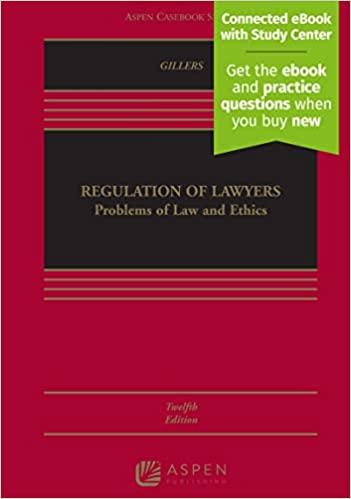Question
Question1 The unilateral change of working conditions by an employer is a breach of an employer's duty to deal fairly with the employee. Determine whether
Question1
The unilateral change of working conditions by an employer is a breach of an employer's duty to deal fairly with the employee. Determine whether the above istrue or false.
a.
True
b.
False
Question 2
It is a requirement, at common law, that a contract of employment must be in writing because it ensures legal certainty. Determine whether the above istrue or false.
a.
True
b.
False
Question3
An employee is entitled to a meal interval of at least 1 hour after five hours work, which may be reduced by 30 minutes only if the parties orally agree to this effect. Determine whether the above istrue or false.
a.
True
b.
False
Question4
Employment terms and conditions are normally agreed upon and contained in the contract of employment, and these provisions are subject to protection of the BCEA. Determine whether the above istrue or false.
a.
True
b.
False
Question5
The dominant impression test considers all factors of the relationship between employer and employee. The court endeavours to establish the true relationship between the parties and not what they choose to call it. Determine whether the above istrue or false.
a.
True
b.
False
Question6
You are the legal advisor for Porter & Moss, a large professional services firm based in Sandton, Johannesburg. Porter & Moss has over 600 employees. 75% of the 40 Porter & Moss senior management personnel are white males. Mr Otto Du Plessis, the Managing Director of the firm, approaches you for advice about what he ought to take into account when he chooses beneficiaries of any affirmative action measures implemented to promote diversity within the firm. Advise him by indicating whichONEof the following isINCORRECTregarding a beneficiary of affirmative action.
a.
The beneficiary must belong to a designated group.
b.
The beneficiary must be suitably qualified.
c.
Historical degrees of disadvantage may influence choosing individuals belonging to one designated group over another.
d.
The beneficiary must have been personally disadvantaged.
Sibusiso, an employee at MDMA, approaches you alleging that his boss, Melanie Matthews has been making unwelcome advances at him of which he believes are of a sexual nature and in violation of MDMA's sexual harassment policy. As MDMA's Human Resource Manager, whichONEof the following statements should be included in your sexual harassment policies?
a.
At times, sexual harassment may amount to unfair discrimination.
b.
Conduct amounting to sexual harassment shall not be prohibited nor condoned.
c.
Retaliation against an employee reporting sexual harassment in good faith will result in disciplinary proceedings.
d.
Employees' reports of sexual harassment allegations may sometimes be publicised.
Question8
Which ONE of the following is not a type of leave provided for under the Basic Conditions of Employment Act?
a.
Personal leave.
b.
Maternity leave
c.
Annual leave.
d.
Sick leave.
Question9
The South African Office Workers' Union (SAOWU) is a majority trade union representing thousands of employees working in the professional and financial services sectors. The Pan-Capitalist Employers' Forum (PCEF) is the main employer's organisation representing employers in these sectors. Both SAOWU and PCEF are members of the National Financial and Professional Sector Bargaining Council (NFPBC), a bargaining council. At the bargaining council, SAOWU and PCEF agree to alter the terms and conditions of employment for all employees who work for PCEF member employers. Advise them whichONEof the following may be altered to below the minimum set by the Basic Conditions of Employment Act?
a.
4 months maternity leave.
b.
Provisions regulating night work.
c.
Two consecutive weeks annual leave.
d.
20 consecutive days parental leave.
Question10
- An employer may justify treating a non-standard employee overall less favourable than another employee on the following grounds. Choose whichONEof the following statements isINCORRECT.
- a.
- The seniority of the other employee.
- b.
- The quality and quantity of work done by employee.
- c.
- The qualifications of the employee.
- d.
- How long the employee has worked for the employer.
An employer may justify treating a non-standard employee overall less favourable than another employee on the following grounds. Choose whichONEof the following statements isINCORRECT.
- a.
- The seniority of the other employee.
- b.
- The quality and quantity of work done by employee.
- c.
- The qualifications of the employees
- d.
- How long the employee has worked for the employer.
Step by Step Solution
There are 3 Steps involved in it
Step: 1

Get Instant Access to Expert-Tailored Solutions
See step-by-step solutions with expert insights and AI powered tools for academic success
Step: 2

Step: 3

Ace Your Homework with AI
Get the answers you need in no time with our AI-driven, step-by-step assistance
Get Started


